Episodes
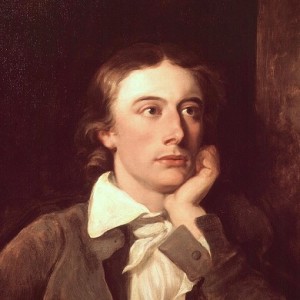
Tuesday Apr 21, 2020
Tuesday Apr 21, 2020
St. Agnes' Eve—Ah, bitter chill it was!The owl, for all his feathers, was a-cold;The hare limp'd trembling through the frozen grass,And silent was the flock in woolly fold:Numb were the Beadsman's fingers, while he toldHis rosary, and while his frosted breath,Like pious incense from a censer old,Seem'd taking flight for heaven, without a death,Past the sweet Virgin's picture, while his prayer he saith.
With those lines, the Romantic Era poet John Keats (1795-1821) began “The Eve of St. Agnes”(available here). A beadsman was someone whose duty it was to pray for his benefactor, the beads being the beads of the rosary.
While he prays in the chapel, in the adjacent castle, Keats tells us, Madeline dreams of her love for Porphyro, her family’s great enemy. Later that night Porphyro arrives at the castle and finds his way to Madeline’s bedroom. She wakes from a dream, the two declare their love for each other, and they run off together.
Dr. Glenn Arbery and Dr. Tiffany Schubert got together—online of course—to discuss the poem for the benefit of Wyoming Catholic College juniors listening at home.
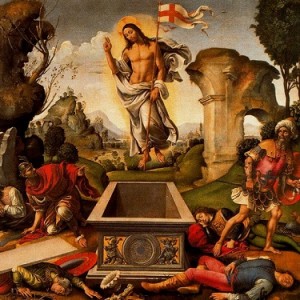
Tuesday Apr 14, 2020
Faith and Reason in Dei Filius with Dr. Kent Lasnoski and Dr. Jeremy Holmes
Tuesday Apr 14, 2020
Tuesday Apr 14, 2020
About 100 years ago, Frank Morison, an English journalist, set out to disprove the resurrection of Jesus by examining the facts. As a result Morison, the skeptic, came to believe that Jesus, the Son of God, crucified, dead, and buried, rose again to give eternal life. Morison’s book, Who Moved the Stone? is still in print today.
This being the Tuesday in the Octave of Easter, I thought of Morison’s experience as I listened to this week’s podcast—a conversation between Dr. Kent Lasnoski and Dr. Jeremy Holmes about faith and reason centering around Dei Filius, the dogmatic constitution of the First Vatican Council issued in 1870.
This document from the 19th century, we'll discover, speaks eloquently to our situation today.
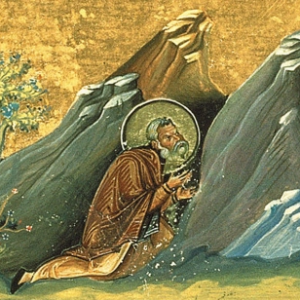
Thursday Apr 09, 2020
Thursday Apr 09, 2020
St. Jerome famously said, “Ignorance of the Scriptures is ignorance of Christ.” Thus knowledge of the Scriptures is knowledge of Christ and the more we know Scriptures—assuming that our hearts are right—the more we will know Christ.
While reading through the Bible is of great value and scholarly study of the Bible is also of great value, the Medieval Masters developed a method of reading the Bible they called lectio divina—and it’s not just for monks in the Egyptian desert. It’s a mystical practice for all of us.
Dr. Baxter explains more addressing “How to Perform Scripture: Lectio Divina and Reading with the Heart” in this final session of “Into the Lenten Desert: Learning to Pray with the Medieval Masters” from Wyoming Catholic College.
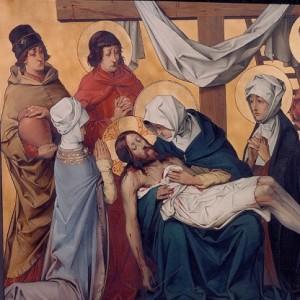
Monday Apr 06, 2020
Sickness, Separation, Grief, and Holy Week by Prof. Kyle Washut
Monday Apr 06, 2020
Monday Apr 06, 2020
Writing at TheCatholicThing, scholar David Bonagura, Jr. writes about Passion Sunday and the blessing and receiving of palms. It’s what we do, he says. Then he goes on, “But not this year. We will not be present to receive our palms, to hold them as the Gospel of Jesus’ triumphal ascent into Jerusalem is read, to make crosses out of them, to thread them through our crucifixes upon returning home. It is a Palm Sunday without palms.”
This year, Palm Sunday without palms will lead to Holy Thursday without our receiving the Eucharist, Good Friday without waiting on line to kneel and to kiss the crucified, and Easter without gathering in the dark to await the light and the resurrection. It is a strange and sad situation.
Here at Wyoming Catholic College, the sadness extends to the loss of our close-knit school community. Great gatherings for Easter brunches and Easter dinners will be limited to immediate family and groups of ten.
Last Friday, our academic dean, Prof. Kyle Washut spoke from his heart to the experience of our students, faculty, and staff. In doing so, he also, I suspect, speaks eloquently to you experience during this Holy Week. Here is what he had to say.

Thursday Apr 02, 2020
Thursday Apr 02, 2020
“The man who truly prayers,” wrote the fourth century monk Evagrios, “is the man who sees the place of God. This is what it means to be a theologian.”
This is lecture six in Wyoming Catholic College’s distance learning course “Into the Lenten Desert: Learning to Pray with the Medieval Masters” with Dr. Jason Baxter.
Following the example of St. Anthony, a steady stream of monks and hermits made their way into the Egyptian desert to seek God. Evagrios was among them, a so-called “desert father.”
In this lecture, Dr. Baxter looks at the writings of Evagrios and the sayings of the desert fathers in order to explain: “Praying with the Whole World: Evagrios and ‘Natural Contemplation.’”

Tuesday Mar 31, 2020
Tuesday Mar 31, 2020
“The conclusion of intelligent design flows naturally from the data itself—not from sacred books or sectarian beliefs,” writes biochemist Michael Behe in his book Darwin’s Black Box. “Inferring that biochemical systems were designed by an intelligent agent is a humdrum process that requires no new principles of logic or science. It comes simply from the hard work that biochemistry has done over the past forty years, combined with consideration of the way in which we reach conclusions of design every day.”
The science curriculum at Wyoming Catholic College pays close attention to the interaction between science, philosophy, and theology with the ultimate goal of achieving a coherent synthesis of faith and reason.
That includes looking long and hard at evolution and the various alternatives to time-plus-chance.
In Science 402, our seniors have just read Darwin’s Black Box and while they’ve been studying at home, they listened to this conversation between their professors, Dr. Scott Olsson and Dr. Jeremy Holmes about Behe’s argument.

Thursday Mar 26, 2020
Thursday Mar 26, 2020
It's been said that God created man in his own image and man kindly returned the favor.
While the Scripture tells us that God saves with his strong arm, most of us understand that this is metaphorical language. God has no arms, legs, hands, feet, eyes, or ears. We know God by analogy because God in His Being is beyond our comprehension. He remains a mystery.
The mystic wants to know God not merely by analogy, but to experience Him in His Being and thus in the darkness of mystery.
In this lecture, “Dionysius the Areopagite and The Darkness of God,” Dr. Baxter explores the mystical tradition of the via negativa.
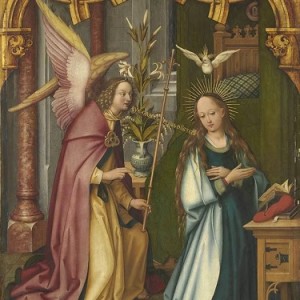
Tuesday Mar 24, 2020
Tuesday Mar 24, 2020
Last week, Wyoming Catholic College students left campus, not for Outdoor Week, but for their homes to wait out COVID-19. As they traveled, our faculty—rather than recording podcasts—did a remarkable job in retooling their courses for distance rather than in-person teaching. Online classes began Monday, March 23.
As millions of Catholics worldwide look to Mary’s intercession in this time of crisis, in theology class our juniors are studying the doctrine of Mary, of the Theotokos, the God-Bearer by reading St. John Henry Newman’s letter to The Rev. E. B. Pusey.
On this extended podcast just in time for the Feast of the Annunciation, you’ll listen in on the class as Dean Kyle Washut and Dr. Jeremy Holmes discuss The Theotokos.

Thursday Mar 19, 2020
Thursday Mar 19, 2020
“And men go abroad to admire the heights of mountains, the mighty waves of the sea, the broad tides of rivers, the compass of the ocean, and the circuits of the stars,” wrote St. Augustine of Hippo in his Confessions, “yet [they] pass over the mystery of themselves without a thought.”
In Confessions, Augustine explores how for years he passed over the mystery of his own self until he began actively exploring that mystery. Why do we behave as we do? What’s the appeal of sin? What’s the appeal of holiness? Why are we so restless? What is truth?
In this fourth lecture in the distance learning course "Into the Lenten Desert: Learning to Pray with the Medieval Masters," Dr. Baxter explores “Augustine’s Restless Heart and the Inward Turn: What Augustine Learned from the Pagans.”
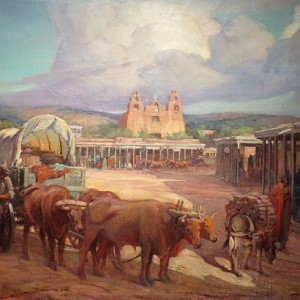
Tuesday Mar 17, 2020
Tuesday Mar 17, 2020
“One afternoon in the autumn of 1851, a solitary horseman, followed by a packmule, was pushing through an arid stretch of country somewhere in central New Mexico. He had lost his way, and was trying to get back to the trail, with only his compass and his sense of direction for guides....Under his buckskin riding-coat [the traveler] wore a black vest and the cravat and collar of a churchman. A young priest...and a priest in a thousand, one knew at a glance. His manners, even when he was alone in the desert, were distinguished. He had a kind of courtesy toward himself, toward his beasts, toward the juniper tree before which he knelt, and the God whom he was addressing.”
Those first lines from Willa Cather’s Death Comes to the Archbishop set the stage for the entire novel. A young priest riding through the middle of the varied landscapes of New Mexico.
Wyoming Catholic College senior Catherine Stypa chose Cather’s novel as the subject of her senior thesis this past the fall and her senior oration earlier this winter. Catherine Stypa is our guest on this edition of The After Dinner Scholar.

